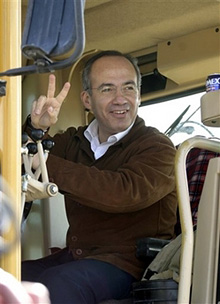 |
 |
 |
 Editorials | Issues | December 2006 Editorials | Issues | December 2006  
Texas Waits to See if Calderon Will Back Up Tough Talk on Cartels
 David McLemore - Dallas Morning News David McLemore - Dallas Morning News


| | Mexican President Felipe Calderon holds up the victory sign as he drives a bulldozer during the opening of an industrial park in the city of Silao, Mexico on Friday Dec. 8, 2006.(AP Photo/Mario Armas) |
Newly inaugurated Mexican President Felipe Calderon talks tough on law and order, and he acted tough in arresting the leaders of a violent protest in the southern state of Oaxaca.

Texas leaders only hope that the tough-on-crime policies extend to lawlessness along Mexico's northern border, where warring drug cartels battling for trafficking routes into the United States - through Texas - have killed hundreds.

In his inaugural speech this month, Calderon promised to strictly enforce the rule of law in Mexico, with no tolerance for violence, whether the result of feuding drug cartels or political opposition.

"Laws must protect citizens, not criminals," Calderon said.

"It won't be easy or quick. It will take time and a lot of money. But rest assured: This is a battle that I will lead."

Calderon promised to make law enforcement one of three top priorities, along with creating jobs and fighting poverty. A budget proposal he presented Tuesday includes a 12.4 percent increase in spending on crime fighting, and he promised a raise for the armed forces, which he deemed crucial to fighting drug traffickers.

He gave his Cabinet 90 days to come up with an anti-crime plan.

Texas Gov. Rick Perry, who attended the inauguration, "takes President Calderon at his word," said spokesman Robert Black.

The cartel war, centered on the border city of Nuevo Laredo, has occasionally spilled into Texas, where border sheriffs say they'd be grateful for some help from Mexican officials.

"If he's going to increase the effort to attack the cartels, it will be a tremendous help," said Zapata County Sheriff Sigifredo Gonzalez, co-chairman of the Southwest Border Sheriff's Coalition.

So far, Calderon seems to be backing up his words.

Last week, he ordered the arrests of the main leaders of the political group that effectively shut down tourism in the southern capital of Oaxaca state. The bloody protest there has led to more than a dozen deaths.

The president used federal police to remove the last of the barricades that had blocked streets in the downtown area for six months and killed the critical tourism industry. President Vicente Fox had been criticized for allowing protesters to take over the city, burn buses, rob governmental buildings and attack local police, who could not control the demonstrators.

Police have been similarly impotent to stop the violence in northern Mexico. One police chief was slain hours after taking office, and another vowed to leave drug traffickers alone. Just this year, according to reports, there have been about 200 drug-related killings in Nuevo Laredo.

And Americans have been drawn into the violence. Two prominent Laredo businessmen are still being held by kidnappers after they and others were seized by 30 armed men on Nov. 26 from a hunting ranch near Nuevo Laredo. Two men were released two days later.

The FBI said 60 U.S. citizens have been kidnapped in the Nuevo Laredo region; 21 of those cases remain unsolved.

Some security experts question how much the new Mexican president can change the situation.

"At this point, there really isn't a lot that President Calderon can do," said Andrew Teekell, an analyst at STRATFOR, a private security consulting firm in Austin. "The drug cartels are deeply entrenched and very powerful."

He said getting control of the violence would take an effort similar to the huge infusion of cash, training and equipment the United States provided the Colombian military while trying to break the power of drug cartels there.

"But Mexico is not Colombia. The Mexican army is relatively weak, and the federal police are too deeply corrupted by drug money to be effective," Teekell said. "The Mexican government has been historically reluctant to let the United States come in with a strong hand in Mexican affairs."

Teekell noted that last summer, Fox ordered the Mexican army into Nuevo Laredo, where it disbanded the entire police force and patrolled the streets until a new one could be hired.

"For a while, the violence slowed, but the flow of drugs did not," he said. "And after the army left, the violence escalated as the cartels continued wrestling for control of distribution networks in Nuevo Laredo. Frankly, I don't see what President Calderon can do that Vicente Fox couldn't."

U.S. Rep. Henry Cuellar, D-Texas, said he hopes the new Mexican president can bring pressure on the cartels, but he noted the problem has already spread into Texas. In a letter to incoming Senate Majority Leader Harry Reid and House Speaker-elect Nancy Pelosi, the congressman urged that the U.S devote more money to fighting drugs and to assisting Mexican law enforcement.

Dallas Morning News correspondent Laurence Iliff in Mexico City contributed to this report. | 
 | |
 |



